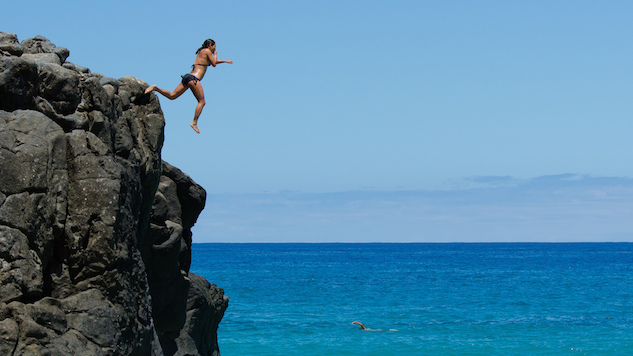Travel Secrets: The Role of Fear

The world is a scary place. Or at least that’s what we often digest from an all-you-can-consume news buffet. Terrorist attacks. Fires. Shootings. Earthquakes and landslides. Tragedy is always around the corner. No place out there is safe.
For some people, fear is an excuse not to travel, to stay inside the perceived safety of a localized bubble. For anyone reading this column—those of us who live to experience and engage more deeply in the world—fear and anxiety may make us more cautious but will never keep us from exploring.
Phil Sylvester, head of PR & Media and travel safety expert for World Nomads says the insurance company sees this attitude echoed in industry surveys. A small percentage of people may change plans or cancel travel altogether based on anxiety, particularly related to terrorism, but the majority of travelers report being cautiously unconcerned and undeterred.
“Travel is up across the board (because it’s never been cheaper to fly than it is now), but the growth to some destinations is lower than others,” he says. “People are not shrinking from travel, they’re just being more careful about where they go.”
Bottom line: We all have fears. Finding healthy ways to deal with anxiety and balance educated-caution with open-hearted exploration is key to keep us traveling and moving forward.
![]()
Keep Fear in Perspective
If you are concerned about terrorism, according to American Psychological Association (APA)Stress in America Survey 2017 you are not alone, says licensed psychologist Heather Austin, Ph.D. “The most commonly reported factors adding stress to our lives in the past 10 years include the economy (44%), mass shootings/gun violence (31%), and terrorism (34%),” Austin says.
She adds that constant exposure to terrorism-related discussions can lead to feeling more at risk than we actually are. When World Nomads asked customers the probability of being a victim of terror attack, nearly 70% said it was unlikely, yet further questioning revealed a gap between perception and reality. “Interestingly the survey respondents listed terrorism ahead of lightning strike as events that are most likely to kill them,” says Sylvester. “In fact, you are four times MORE likely to be killed by lightning than a terrorist.”
To gut-check fear, examine statistics and be honest with yourself about probabilities. “A key component of managing anxiety is self-education or teaching your brain and emotions to be more truthful,” says Austin. “Being a victim of terrorism is a rare event, convincing your brain and emotions that this is true will definitely help you cope better.”
Manage Triggers
Ask yourself what’s driving the anxiety. In most cases, we fear what we don’t know or what we can’t control. Xavier Mufraggi, Club Med CEO North America, recommends becoming empowered through knowledge. “You feel more in control when you are educated,” says Mufraggi. If flight turbulence sends you into panic mode, understand how the plane and pilot are designed to respond and what safety measures are in place, he says.
Austin agrees, saying the more we understand dynamics at play, the greater the comfort level. For example, she suggests focusing on what professionals are doing to keep you safe. “Think about all those annoying, long lines at airport security and some of the personal items you have had to part ways with to try to increase our overall safety,” she says.
Sylvester also recommends developing an emergency plan for different scenarios to increase your sense of control. Locate exits in public places. Designate a meet up spot in case of separation. Know emergency phone numbers—911 equivalents—wherever you travel.
Avoid Oversaturation
A story in my Facebook feed grabbed my attention this morning. Small plane crashes on Southern California’s 405. Watch the dramatic video and hear the recording between pilot and air traffic control.
As my finger hovered over the link, I asked myself the purpose of watching the video. Would it serve me well? Or is it simply the digital equivalent of rubber-necking? With greater access to more information than ever before, how much detail do we really need?
Mufraggi says while being informed is important there’s a point where excessive information has a negative impact. “Avoid fixating on the news,” he suggests. “Fear is cultivated by what we see around us.” At times, each of us can become overinvested in the tragedy of the news cycle. Mufraggi recommends seeking specific information you need, then filtering out the rest as noise.
Just as our body is reflective of what we eat, our mind and emotional wellness reflects what we see and hear. Many of us—myself included—could benefit from a media diet.
View the Big Picture
No country or people have a corner on fear. Recently as my husband and I were traveling to Montenegro from Italy, many Italians said, “You shouldn’t go there, it’s dangerous.” As we moved on to Albania, a chorus of Montenegrins echoed the same sentiment about their southern neighbor. In Thailand, locals said, “Oh no, you can’t go to Myanmar!” And so, it goes, the theme repeating around the world. We all fear the other, it seems.
Likewise, many Americans might be surprised to learn how dangerous our country is perceived when viewed from afar. While people all over the world still dream of traveling to the U.S., many are terrified of gun violence. The news they see from America often spotlights the latest tragedy – a mass shooting, school shooting, or police-kill-civilian story. There’s a very real perception that every American is locked and loaded.
Why does this matter? When we acknowledge fear as a common human emotion, we can begin to see beyond the headlines and more accurately assess the realities of travel in unfamiliar destinations.
Keep it Healthy
Fear is inherently healthy, leading us to be more cautious and attentive and make better decisions. “Fear is an adaptive human response that is essential for our survival,” says Austin. “We use our ‘Spidey-sense’ to make quick decisions to keep ourselves safe and to put on the breaks when we needed.”
She recommends practicing mindfulness and being present in the moment to keep worries in check. “Methods of relaxation such as abdominal breathing, muscle tension and relaxation and guided imagery can be very useful tools to practice and have available for those moments when anxiety and worries start,” she says.
Personally, music is my go-to for finding calm. Before trips, I download “happy” music playlists, but even if those are out of reach when I hit an anxious spot—which usually happens in confined spaces (claustrophobia tops my list of fears)—I hum a favorite tune to bring emotions under control.
Don’t overlook the comforting power of personal items as well, says Austin. Bring along your go-to snuggly sweater or favorite family photograph, whatever brings a sense of peace. “If you are still struggling,” says Austin, “talk to a psychologist, the side effects are a better life.’”
[Source:-pastemagazine]




